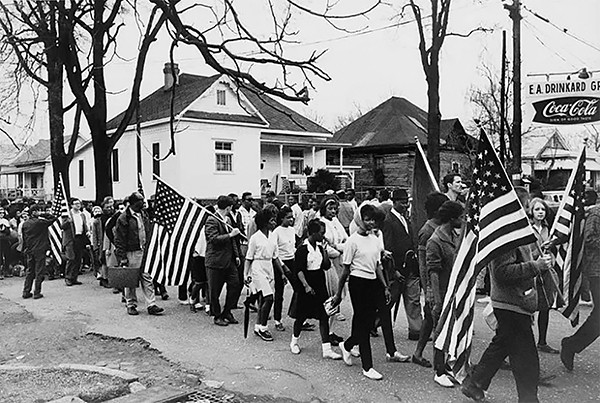Last week, I took my 6-year-old niece with me to early vote. As we walked into the polling place, hand in hand, I lied to her. I didn’t intend to. I just wanted to make the short walk from the parking lot to the building a quick lesson on voting rights.
What we’re about to do, I told her solemnly, is very, very important.
Slipping into the same voice I use to read bedtime stories, I began: A long, long time ago, there were people who fought really hard to keep people like us — Black people — from voting. But Black people and some white people worked really hard to make sure we could. To make those Black people proud, I said, we have to vote in every election. And, I added as a happily ever after, that’s why we were going to vote today.
 Peter Pettus, Library of Congress
Peter Pettus, Library of Congress
Participants in the civil rights march from Selma to Montgomery, Alabama, in 1965
No sooner had the words left my mouth when I realized I had not been honest. Why had I placed voter suppression in the distant past? Why did I feel compelled to leave out the violence, the blood spilled, the murders? Why did I obscure the villains, leaving them colorless as if their identities aren’t known?
The truth is this: Voter suppression, intimidation, and systemic disenfranchisement wasn’t long, long ago or in a place far away. It’s happening now, here, and all around.
Since the 2010 elections, 24 states have passed laws making it harder to vote, according to the Brennan Center for Justice. From shrinking the number of early voting locations, cutting back the early voting period, enacting strict voter ID laws, and purging infrequent voters from the rolls, Republican-led attacks against the franchise seem unrelenting.
Recently, the Memphis branch of the NAACP sued the Shelby County Election Commission after it limited early voting locations to the Agricenter, which is outside the city core and closer to parts of the county that are majority-white, even though Shelby County is predominantly Black.
The NAACP won its suit, but the commission still managed to open late a key early voting site in the city’s core. The commission blamed it on a miscommunication with poll workers, but it read as spiteful, as if election officials were thumbing their noses at voting rights advocates.
The NAACP and the Tennessee Black Voter Project have since sued the commission again, “for its refusal to allow voters who submitted timely, but allegedly deficient, voter registration applications to correct any deficiencies in those applications on or before Election Day and then vote regular ballots.” A judge ruled against the commission this week.
In Houston, Texas, there have been allegations that volunteer Korean translators were being kicked out of polling places. In Kansas, the lone polling place in the majority-Hispanic town of Dodge City has been moved into the county, a mile from the nearest bus stop.
Ever since the Supreme Court overturned parts of the Voting Rights Act in 2013, Southern states previously required to get federal okay before changing election laws rushed to make it harder for Black and brown people to vote.
“The decision in Shelby County opened the floodgates to laws restricting voting throughout the United States. The effects were immediate. Within 24 hours of the ruling, Texas announced that it would implement a strict photo ID law. Two other states, Mississippi and Alabama, also began to enforce photo ID laws that had previously been barred because of federal preclearance,” said the Brennan Center.
But I didn’t tell my niece about the Shelby County, Alabama v. Holder case that took the teeth out of the Voting Rights Act.
I didn’t tell her about Mississippi voting rights advocate and all-around badass Fannie Lou Hamer, an Indianola, Mississippi, tenant farmer who was fired by her plantation owner after she tried to register to vote in 1962. Undeterred, she opposed the state’s all-white delegation at the 1964 Democratic National Convention. Four years later, she was chosen as a delegate for the party’s presidential nominating committee in Chicago.
If I close my eyes, I can see the horrifying image of a battered John Lewis, beaten by a state trooper on Bloody Sunday in Selma, Alabama, in 1965 for the crime of being a Negro trying to register other Negroes to vote. I know the names of martyrs Andrew Goodman, Mickey Schwerner, James Chaney, Rev. James Reeb, and Viola Gregg Liuzzo, all slain because they sought voting rights for Black people in the South.
None of this brutal, gruesome, painful, wretched history did I share with my beautiful, cornrow-wearing, baby teeth-missing, still-needs-a-nap niece. These American stories are the stuff of Black nightmares. So I lied. I turned the fight for the ballot into a fairy tale, where in the end, the arc of the moral universe bends toward justice. And while I hope that comes to pass, I’m not sure that’s true either.
I’m not proud of my lie. I was simply trying to shield my niece from what she’ll see soon enough: That the mean people who didn’t want Black people to vote then are still with us now.
Wendi C. Thomas is the editor and publisher of MLK50: Justice Through Journalism, where a version of this column first appeared.